The midterm elections took place on Nov. 4, and resulted in an overwhelmingly low voter turnout rate at 36.4 percent of eligible voters, according to Time, marking the lowest turnout rate in 72 years for this type of election.
The party affiliation of participating voters is important to note. In this year’s midterm elections, the majority of voters identified with the Republican Party.
Patrick Murray, Director of the Monmouth University Polling Institute, was not surprised by the voter turnout this year due to “a lack of trust in the government today.” He also acknowledged Obama’s extremely low approval rating of 40 percent according to a November 2014 poll by Gallup. This lack of trust in the government today could signal citizens losing interest in voting in elections.
Dr. Kenneth Mitchell, associate professor of political science, said, “This is the second term, so the current president will not be running in 2016.” He added that despite having won two presidential terms, the Democratic Party lacks the support and resources one would expect after eight years of presidency.
Additionally, the Democratic Party is aware the second term for Obama will be over in just two years and as such is not as motivated to vote during the midterm elections. The Republican Party, on the other hand, is in full speed to get the presidency back under Republican power.
“People who say they are connected to the current president are not particularly motivated [to vote], because he’s gone,” said Mitchell.
Along with the Democratic Party having little motivation to get to the polls this year for the midterm elections because of the anticipated leave of Obama from the presidency, the youth of America have more impact on voting than they realize.
Caitlyn Bogart, a freshman biology major, said she “did not participate in the 2014 midterm elections.” However, she believes “it is important for young people in the United States to become a part of voting.”
Young people in America tend to be primarily Democrat rather than Republican, according to a March 2014 Gallup poll.
Sabrina Schreiber, freshman sociology major, agreed stating that she “did not participate in the 2014 elections,” as well but that she also was not a registered voter yet. Schreiber and Bogart also agreed that although they did not participate in this year’s midterm elections, they would participate in the 2016 presidential election.
This is also influential in the predicting for the 2016 presidential election. If young adults like Schreiber and Bogart plan to take part in the 2016 election, Democrats may have more of a chance than they did with the midterm elections.
Mitchell also speculated that the Republicans could have an advantage in the 2016 presidential elections. He said, “It depends on what they do. Because on the one hand the Democrats took control in 2006 which gave them momentum that lead them to Obama, which helped Obama.” If this pattern follows into the 2016 elections, the Republicans have full advantage.
However, holding seats in Congress may not work out in their favor. Mitchell also stated that it is very possible that, “Obama and the Republicans just fight and nothing gets done.” Mitchell also noted, “What if the Republicans compromise with Obama? That might anger Republicans or divide Republicans so then the primaries in 2016 will be a bloodbath.”
According to Mitchell, holding power in Congress could go either way and it all depends on the moves they make in these two years and whether or not the Republican Party can remain united and continue its momentum into 2016 to gain a promising Republican candidate.
IMAGE TAKEN from PBS.org



